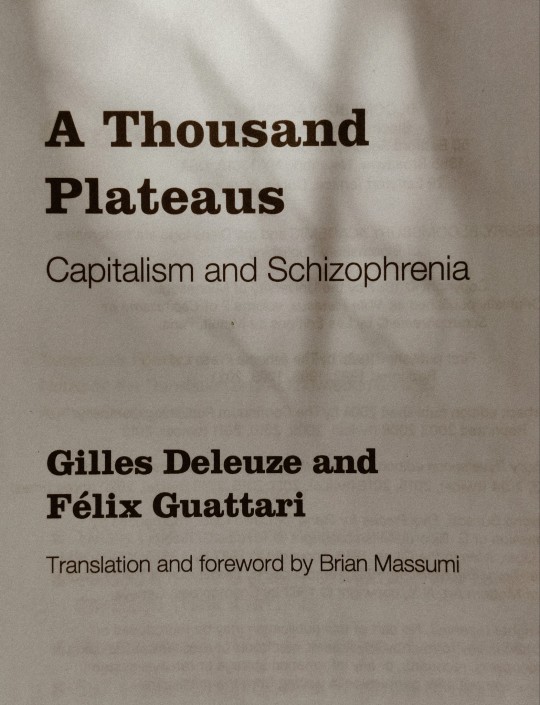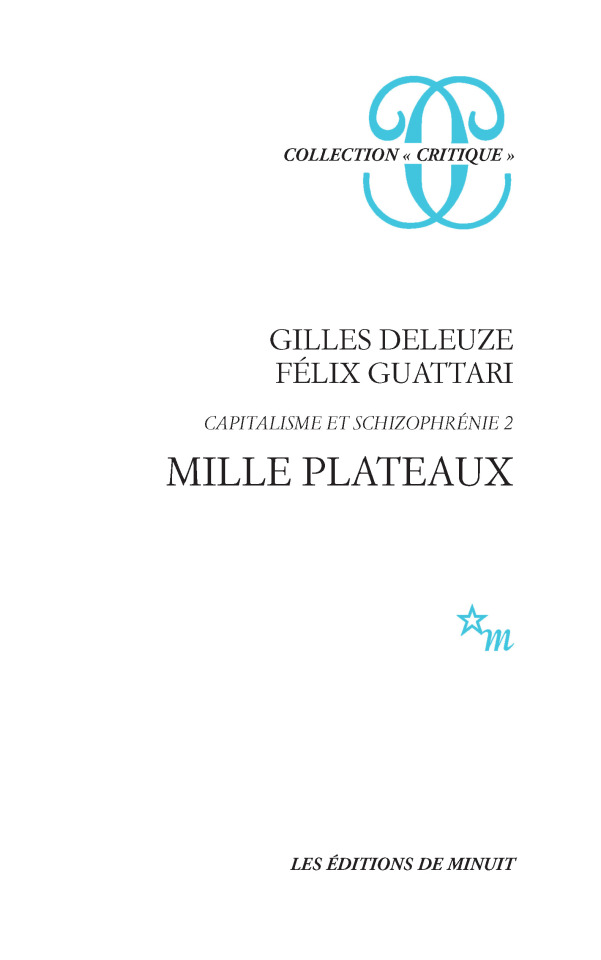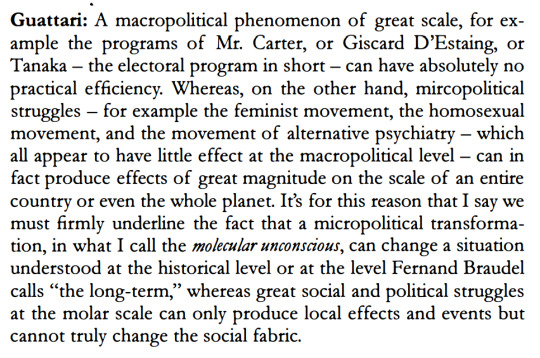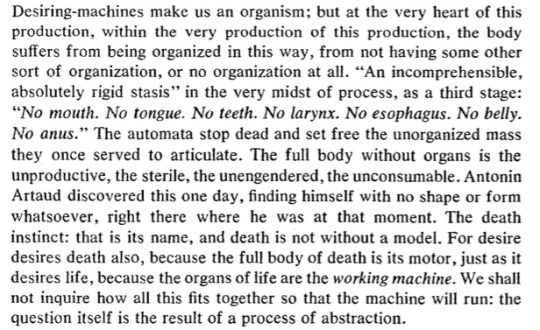#félix guattari
Text
Guattari’s idea is both refreshing and profound. He suggests that when a person experiences psychosis, her psychosis changes according to her surroundings, and, therefore, treating her with fear by locking her up, keeping her in restraints, overmedicating her, and exposing her to other methods of suppression only serves to change her psychosis to a psychosis of fear and paranoia. Who, psychotic or not, in the same situation wouldn’t also feel terror and paranoia? Indeed, there is a legitimate reason to be paranoid and afraid. Further, the shock of being treated inhumanly, the sense of alienation and of betrayal, and, perhaps paramountly, the realization that humans can and do treat other humans in this way, is itself shocking and traumatizing. It is a shock and trauma that alters the psyche, changing the personality of the person who undergoes it.
Cynthia Cruz, Disquieting: Essays on Silence
2K notes
·
View notes
Text
A true politics of psychiatry, or anti-psychiatry, would consist therefore in the following praxis: (1) undoing all the reterritorializations that transform madness into mental illness; (2) liberating the schizoid movement of deterritorialization in all the flows, in such a way that this characteristic can no longer qualify a particular residue as a flow of madness, but affects just as well the flows of labor and desire, of production, knowledge, and creation in their most profound tendency. Here, madness would no longer exist as madness, not because it would have been transformed into "mental illness," but on the contrary because it would receive the support of all the other flows, including science and art—once it is said that madness is called madness and appears as such only because it is deprived of this support, and finds itself reduced to testifying all alone for deterritorialization as a universal process. It is merely its unwarranted privilege, a privilege beyond its capacities, that renders it mad. In this perspective Foucault announced an age when madness would disappear, not because it would be lodged within the controlled space of mental illness ("great tepid aquariums"), but on the contrary because the exterior limit designated by madness would be overcome by means of other flows escaping control on all sides, and carrying us along.
– Gilles Deleuze and Félix Guattari, Anti-Oedipus: Capitalism and Schizophrenia
Perhaps one day one will no longer know clearly what madness really was...Artaud will belong to the ground of our language, and not to its rupture...Everything that we experience today in the mode of the limit, or of strangeness, or of the unbearable, will have joined again with the serenity of the positive. And what for us currently designates this Exterior stands a chance, one day, of designating us.
– Michel Foucault, History of Madness
#a world created in the process of its tendency#je est un autre#gilles deleuze#félix guattari#michel foucault#anti-oedipus
149 notes
·
View notes
Text

girl,,,
34 notes
·
View notes
Text

Gillez Deleuze, Félix Guattari
16 notes
·
View notes
Text


on wednesdays we (try to) read deleuze.
#gilles deleuze#félix guattari#psychoanalysis#george orwell#a thousand plateaus#the road to wigan pier#political philosophy#french literature#studyblr#booklr#dark academia#light academia#dark academia aesthetic#light academia aesthetic#mine#studyblog#bookblog
6 notes
·
View notes
Text

Mille plateaux
Capitalisme et schizophrénie 2
14 notes
·
View notes
Text
“What insures the transition of the great classical fascist entities to the molecularization of fascism we are witnessing today? What drives the deterritorialization of human relations, what makes them lose their foundation in territorial and familial groupings, the body, age classifications, etc? What is this deterritorialization which engenders, in turn, the mounting of microfascism? This involves not only a simple question of ideological orientation or of strategy on the part of capitalism, but a fundamental material process: it’s because industrial societies function on the basis of semiotic machines which increasingly decode all realities, all of the former territorialities; and it’s because technical machines and economic systems are increasingly deterritorialized that they are capable of liberating increasingly greater fluxes of desire; or, more exactly, it’s because their mode of production is forced to carry out this liberation, that the forms of repression are equally incited to become molecularized. A simple massive repression is no longer enough. Capitalism is obliged to construct and impose models of desire; and its survival depends on its success in bringing about the internalization of these models by the masses it exploits. It is preferable that everyone be attributed with: a childhood, a sexual positioning, a relationship to knowledge, a representation of love, of honesty, of death, etc. Capitalist relations of production are not simply established on the scale of great social groupings; from the cradle onward, they shape a certain type of producer-consumer individual. The molecularization of the processes of repression, and by extension, this prospect of a micropolitics of desire, are not therefore linked to an ideal evolution of history or to ideological mystifications, but to a transformation of material processes, to a deterritorialization of all forms of production, whether it involves social production or a desiring-production.”
— Félix Guattari, [discussion of] Everybody Wants to Be a Fascist, in Chaosophy (tr. David L. Sweet, Jarred Becker, & Taylor Adkins)
34 notes
·
View notes
Text

Félix Guattari on the micropolitical vs macropolitical.
Source: Machinic Eros
#félix guattari#guattari#machinic eros#deleuze#gilles deleuze#anti oedipus#schizoanalysis#a thousand plateaus
67 notes
·
View notes
Text

Is this most likely a typo in a shitty pdf? Yes. Am I going to run with the idea that Deleuze and Guattari theorized about the preservation of the Jeff? Also yes
3 notes
·
View notes
Text
me sitting on mount stupid: but can i get higher?
7 notes
·
View notes
Text
the self is only a threshold, a door, a becoming between two multiplicities
- from A Thousand Plateaus, Gilles Deleuze and Félix Guattari
2 notes
·
View notes
Photo

Gilles Deleuze and Félix Guattari, Anti-Oedipus
494 notes
·
View notes
Text
Desire knows nothing of exchange, it knows only theft and gift.
– Gilles Deleuze and Félix Guattari, Anti-Oedipus: Capitalism and Schizophrenia
125 notes
·
View notes
Text

Deleuze & Guattari: Anti-Oedipus
#what i've been saying ‼#gilles deleuze#félix guattari#deleuze and guattari#capitalism and schizophrenia#anti-oedipus
3 notes
·
View notes
Text
It is not simply linguistic, lexical, or even syntactic transformations that determine the importance of a true semiotic translation but the opposite. Crazy talk is not enough. In each case we must judge whether what we see is an adaptation of an old semiotic, a new variety of a particular mixed semiotic, or the process of creation of an as yet unknown regime. For example, it is relatively easy to stop saying “I,” but that does not mean that you have gotten away from the regime of subjectification; conversely, you can keep on saying “I,” just for kicks, and already be in another regime in which personal pronouns function only as fictions. Signifiance and interpretation are so thick-skinned, they form such a sticky mixture with subjectification, that it is easy to believe that you are outside them when you are in fact still secreting them. People sometimes denounce interpretation yet show so signifying a face that they simultaneously impose interpretation upon the subject, which continues to nourish itself on it in order to survive. Who can really believe that psychoanalysis is capable of changing a semiotic amassing every deception?
"587 BC-AD 70: On Several Regimes of Signs", Gilles Deleuze and Félix Guattari, A Thousand Plateaus
8 notes
·
View notes
Text

Create Art Via Art Piece, 2022
an eco-friendly, diverse and inclusive artwork about the primordial rage you experience in studying philosophy. perfect mix of shitpost and art. suitable for all ages, fun for the whole family. buy now, only 9999999999999999 currencies on killnickland.com. 410,757,864,530 WOKE MORALISTS APPROVE
#euker art#gilles deleuze#félix guattari#deleuze#guattari#d&g#art#digital art#drawing#digital drawing#collage#art collage#before anyone asks no i havent read hegel#i will i prommy#now get off my lawn *punts you*
26 notes
·
View notes